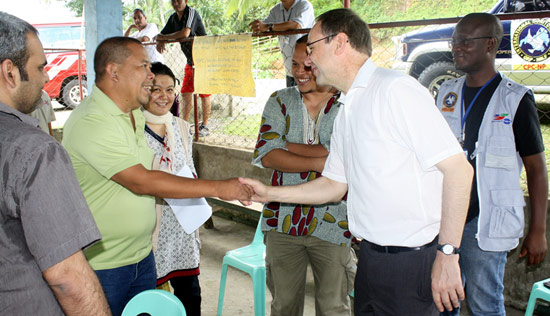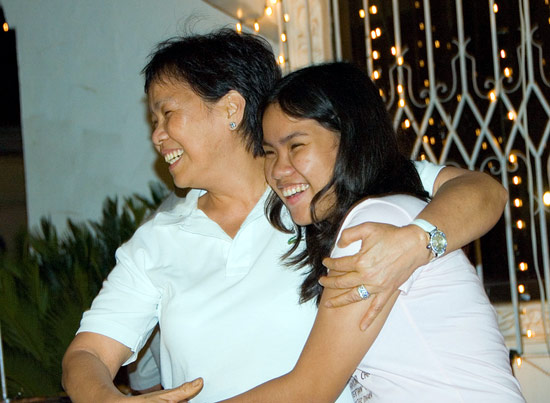Culture and Society: Greetings and Courtesies
General
The Philippines is a hierarchical society which values authority, pride and "face" (personal dignity and respect within the community). While social etiquette between friends is usually relaxed, formal intercourse is characterized by a deference towards older people and the powerful. Note: English is widely-spoken in the Philippines, so greetings and courtesies are as likely to be in this language as Tagalog or any of the other indigenous tongues.
Informal Greetings
Filipino men typically greet each other with a firm handshake, a big smile and sometimes a friendly pat on the elbow. They will rarely shake hands with a Filipina for fear of appearing morally presumptuous, but will shake hands with a foreign woman if she extends her hand first. Even in informal situations, it is customary for the eldest or most important person to be greeted first by a newcomer as a mark of respect. Close female friends and family members tend to hug or kiss each other when they meet in an expression of their love for each other.
When socializing informally, Filipinos call each other by their first names or by a (usually Americanized) nickname. Friends greet each other with the English Hi or Hello or, in Tagalog, Kumusta ka? (How are you?) to which someone might reply Mabuti naman (I’m fine). Informal introductions usually begin with Ano po ang pangalan nila? (What is your name?) to which the appropriate reply would be Ako si ___ (I am ___). Maraming salamat (Thank you very much) is a common expression of thanks or agreement.
When it comes to farewells, Filipino friends may say to each other Palaam (goodbye) or O sige alis na ako (Okay, I’m leaving now). Even more casually, Filipinos might say ba-bay, slang derived from the English "bye-bye."
Formal Greetings
All Filipinos who do not fall into the category of friends and family are addressed in a more formal register. The Tagalog word po is always added to greetings and courtesies when an older or socially superior person (teacher, soldier, official, pensioner, or older member of an associate's family or kinship group) is being addressed as in Salamat po (Thank you). When a Filipino man greets another man formally, it is polite to shake hands firmly and make brief eye contact.
Filipinos place great value on professional titles, ranks, honors and awards, resulting in even lowly part-time teachers calling themselves "Professor." Military personnel can be quite virulent in their demands for respectful titles and conduct. High-status Filipinos expect to be called by their professional titles followed by their surname, or, once the relationship has warmed, with Sir or Ma'am before their surname (e.g., Doctor Santos or Sir Santos). Colleagues of the same rank frequently call each other by first names preceded by Sir or Ma'am (e.g., Ma'am Imee), but it is considered unusual for foreigners to do so.
A Filipino typically greets someone formally by saying Magandang umaga po (Good morning), Magandang tanghali po (Good noon), Magandang hapon po (Good afternoon), Magandang gabi po (Good evening). If a mutual acquaintance isn't available to introduce strangers, a Filipino may say Ako po si ___ (I am ___).
To politely ask after someone's well-being, a Filipino will ask Kumusta po kayo? (How are you?) to which an appropriate response is Mabuti po naman (I’m fine). At the end of a formal encounter, Filipinos tend to shake hands once more and say to one another, Sig po Palaam (OK, I’m leaving now). It is common that someone else in the meeting will ask, Aalis ka naa? (You leaving already?) not as a direct question but as a rhetorical expression implying something like "Take care and hope to see you again." Alternately, a departing Filipino is likely to say, in English, "Nice to have met you," to expresses pleasure and create warm feelings for future interactions.
Business Greetings
Business greetings are more or less identical to formal greetings, with a special emphasis placed on "getting off on the right foot" at the beginning of a deal or working relationship. One way of achieving this is through the almost ritualistic exchange of business cards, normally offered and received with both hands. Business cards are clearly marked (usually in English for global business purposes) with their owner’s job title, address, and achievements; courtesy dictates that one studies the card with keen interest.
In group situations, one typically introduces oneself formally using the phraseology above, unless one is speaking at a conference or dinner, in which case the host will normally make a lengthy and detailed introduction. At the beginning of a business relationship, people refer to one another with English honorifics like Mr., Mrs., Sir, or Ma'am, followed by a surname. Decades of cultural interaction with the United States means that business roles and titles are used in English, just as in the Western corporate environment: CEO, Executive, Senior Manager, Middle Manager, etc.
Conversation Topics
Filipinos ordinarily pick polite and upbeat topics of conversation in order to preserve pakikisama (a harmonious and loyal social atmosphere). That said, it is normal for Filipinos to inquire about one another’s personal details such as religion, marital status, and income. They tend also to enjoy talking about sport (especially the national obsession, basketball), music, movies, and celebrities.
Taboos
There is a strong Filipino tradition of being careful to make sure that words or actions are never openly insulting. In all conversations, Filipinos steer way clear of gossip or personal information that might cause hiya (a culturally ingrained sense of personal shame arising from public humiliation or failure to live up to social expectations). Similarly, failure to formally address someone of high status often results in grave offence being taken. These quintessentially Filipino sensitivities are thought to derive from the Asian concept of "face" coupled with the traditional Spanish value of amor propio (love-of-self). Centuries of colonial domination have also produced an inferiority complex amongst elements of the population.
Filipino conversations tend to avoid divisive political issues such as the ongoing Mindanao crisis.
When shaking hands, Filipinos don't maintain eye contact for too long, as this may be construed as inquisitive or confrontational.
There is a strong tendency toward grudge-holding and revenge in Philippine culture, meaning that the penalty for a social faux pas could be the severing of a personal or business relationship.
Article written for World Trade Press by Tom Sykes.
Copyright © 1993—2025 World Trade Press. All rights reserved.

 Philippines
Philippines 

